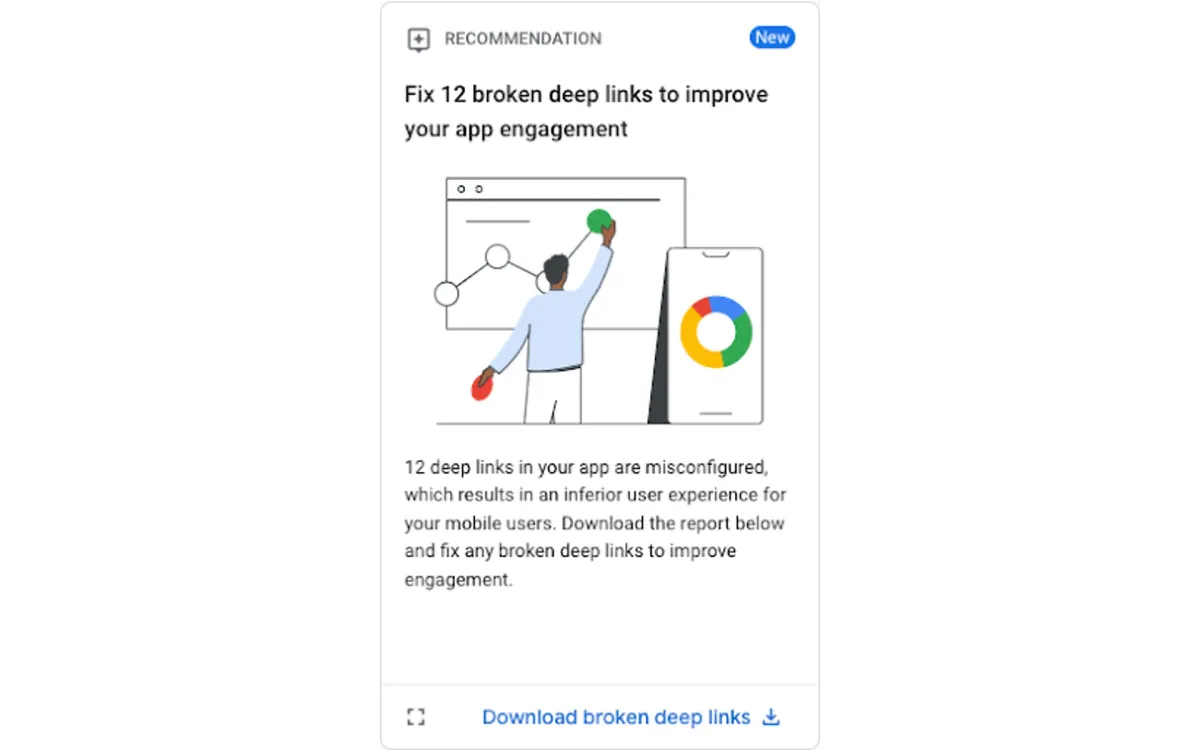
On October 1, 2024, Google Analytics unveiled a new recommendation feature designed to help app developers identify and rectify misconfigured deep links. This update, announced just yesterday, addresses a critical issue that can significantly impact user experience and app engagement for mobile applications.
What are Deep Links?
Deep links are a fundamental component of mobile app functionality, enabling users to navigate directly to specific content within an app from external sources. According to Google's documentation, deep links can be implemented as either App Links for Android devices or Universal Links for iOS devices. These links are designed to seamlessly direct users to relevant in-app content when they click on a link, provided they have the app installed on their device.
Types of Deep Links
Google Analytics documentation outlines two main types of deep links:
- App Links (Android) and Universal Links (iOS): These are the industry standard, using existing HTTP destinations to direct users who have installed the app to specific in-app content. Users without the app are redirected to the mobile website.
- Custom Schemes: These are custom URIs that link to in-app content. While requiring less engineering support, they are less secure and can potentially be claimed by other apps.
The Importance of Properly Configured Deep Links
Properly configured deep links play a crucial role in enhancing user experience and increasing app engagement. Well-implemented deep links offer several benefits:
- Improved Security: App Links and Universal Links ensure that no other app can use your links, preventing traffic redirection to unauthorized apps.
- Relevant Page Results: Users are sent to specific pages within the app rather than browser or mobile web pages, enhancing the user experience.
- Seamless User Experience: Deep links provide a more integrated experience for app users, potentially increasing key events, conversions, and customer loyalty.
Google Analytics' New Recommendation Feature
The newly introduced recommendation feature in Google Analytics aims to address two primary issues related to deep links:
- Missing Deep Links: For users who have linked their Google Ads account to their Google Analytics property, have an active app data stream, and eligible campaign spend, Google Analytics will recommend implementing missing deep links. This recommendation includes a downloadable report of ad URLs ranked by corresponding missed conversions.
- Misconfigured Deep Links: For users with an active app data stream and misconfigured App Links or Universal Links, Google Analytics will surface a recommendation to fix these deep links. This includes a downloadable report of broken deep links, ranked by each link's corresponding user engagement on mobile web traffic.
How to Access and Use the New Feature
To access this new feature, users with appropriate permissions can navigate to the Recommendations section of their Google Analytics dashboard. Here, they will find the option to download a CSV file containing a list of missing or misconfigured deep links, along with associated data.
Implementing the Fixes
To implement or fix the identified deep links, app developers are advised to work closely with their development teams. Google recommends referring to official Android and iOS documentation for guidance on proper deep link implementation.
Technical Aspects of Deep Linking
Implementing deep links involves several technical components:
- URL Configuration: For App Links and Universal Links, existing HTTP destinations need to be configured to direct users to specific in-app content.
- App Indexing: This process makes app content discoverable through search engines, enhancing the app's visibility.
- Handling Users Without the App: For users who don't have the app installed, the system needs to gracefully redirect them to the mobile website or app store.
Challenges in Deep Link Implementation
Implementing deep links can present several challenges:
- Platform Differences: Android and iOS have different implementation methods (App Links vs. Universal Links), requiring separate configurations.
- App Updates: Changes in app structure or content can potentially break existing deep links, necessitating regular maintenance.
- Testing and Verification: Ensuring deep links work consistently across various devices and operating systems requires thorough testing.
Impact on User Experience and App Engagement
Fixing misconfigured deep links can have a significant impact on user experience and app engagement metrics. Properly implemented deep links can lead to:
- Increased Retention: Users are more likely to return to an app that provides a seamless navigation experience.
- Higher Conversion Rates: By directing users to specific in-app content, the likelihood of completing desired actions increases.
- Improved User Satisfaction: A smooth transition from external links to in-app content enhances overall user satisfaction.
Future Implications for App Developers
As mobile app usage continues to grow, the importance of effective deep linking is likely to increase. App developers who leverage tools like Google Analytics' new recommendation feature may gain a competitive edge in user retention and engagement.
Key Facts
- Google Analytics introduced a new deep link recommendation feature on October 1, 2024.
- The feature identifies both missing and misconfigured deep links (App Links for Android, Universal Links for iOS).
- Users can download reports listing problematic deep links, ranked by engagement or missed conversions.
- Deep links improve security, provide relevant page results, and offer a seamless user experience.
- Implementing deep links involves configuring URLs, app indexing, and handling users without the app installed.
- Challenges include platform differences, maintaining links through app updates, and consistent cross-platform functionality.
- Properly implemented deep links can significantly improve user retention, conversion rates, and overall satisfaction.
- The feature aims to help developers enhance app engagement and user experience through better deep link implementation.

